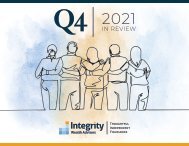You also want an ePaper? Increase the reach of your titles
YUMPU automatically turns print PDFs into web optimized ePapers that Google loves.
THE IMPACT OF<br />
SOUND FINANCIAL<br />
PLANNING<br />
PAY OFF STUDENT LOANS OR SAVE<br />
FOR RETIREMENT?<br />
Recent Vanguard research 1 shows that an experienced<br />
wealth management team not only adds peace of mind,<br />
but also may add about 3 percentage points of value in<br />
net portfolio returns over time. What does this mean? Your<br />
team has the ability and the time to evaluate your portfolio<br />
investments, meet with you to discuss objectives, and<br />
help get you through tough markets. All of these factored<br />
together potentially add value to your net returns (returns<br />
after taxes and fees) over time. But the most interesting part<br />
of this research is that it shows that financial planning and<br />
financial coaching contributed to the greater majority of the<br />
added net 3% in net portfolio returns.<br />
It’s important to realize how valuable making sound financial<br />
planning decisions is and that value is added by your<br />
financial planning team. As investors, our emotions can be<br />
our worst enemy, especially when the markets are volatile,<br />
and guidance from a “behavioral coach” can save us from<br />
panic-selling and abandoning long-term financial plans.<br />
Numerous studies demonstrate that advisors can have a<br />
huge impact on investor finances, but it’s hard to say if these<br />
findings have been recognized and understood by everyday<br />
investors.<br />
DREAM.<br />
PLAN.<br />
ENJOY.<br />
After a three-year pause during the<br />
pandemic, student loan payments are back.<br />
This also marks the return of a perennial<br />
question for recent (and, in this case,<br />
not-so-recent) grads: Should I pay down<br />
my student loans before I start saving for<br />
retirement?<br />
It can be tempting to postpone saving for<br />
things like an emergency fund or goals<br />
like retirement, especially if you're young<br />
and aren't making a lot of money. However,<br />
thanks to the power of compounding,<br />
setting aside even small amounts<br />
when you’re young could help you build<br />
significant savings by the time you're<br />
retired.<br />
It's not impossible to tackle student debt<br />
while also saving for retirement. Consider<br />
prioritizing these steps:<br />
1. Make the minimum loan payments<br />
The cardinal rule for paying off student debt<br />
is: Don't miss payments. Make at least the<br />
minimum payment on every loan and ensure<br />
the amount fits your monthly budget. As<br />
you repay your loan, you're establishing<br />
credit history, and your student loan interest<br />
payments may be tax-deductible if your<br />
adjusted gross income is less than $85,000<br />
($175,000 for joint returns). So, there's an<br />
upside to starting payments and making<br />
them on time.<br />
2. Maximize 401(k) contributions to at least<br />
get the match<br />
Your next priority is to consider your<br />
qualified workplace retirement plan. You'll<br />
want to contribute as much as you can<br />
afford to your 401(k)—or 403(b) if you<br />
work for a nonprofit or 457(b) if you're<br />
a government employee—up to your<br />
employer's match. Not contributing enough<br />
to receive the match (often 5% or 6%)<br />
is turning down what's effectively "free<br />
money."<br />
3. Pay off high-interest-rate debt<br />
Debt with a high interest rate, such as that<br />
held on a credit card, can quickly pile up—<br />
especially if you carry over your balance<br />
from month to month. Start by cutting back<br />
your credit card use and put extra money<br />
toward your balance. With less debt, you'll<br />
be able to save more for retirement and<br />
other financial goals.<br />
4. Build an emergency fund<br />
Life happens, and you should plan for<br />
the unexpected. Otherwise, you might<br />
find yourself relying on your credit card<br />
or retirement savings during a financial<br />
setback. Keep the money in a high-interest<br />
savings or money market account where it<br />
can grow and where you can easily access<br />
it should you need to make a withdrawal.<br />
5. Put additional funds to work<br />
When you're fortunate enough to have<br />
leftover funds, use them wisely. After you've<br />
paid your debts—and yourself—consider<br />
investing the rest in the market. While<br />
investing involves risks and you could lose<br />
money in the market, you may also gain<br />
more from investment returns over the long<br />
run.<br />
The bottom line<br />
Juggling student debt can be tricky but<br />
investing in your future is worth it. College<br />
graduates can successfully manage loan<br />
repayment while saving for retirement. You<br />
don't have to choose one over the other, let<br />
us help you navigate these decisions.














